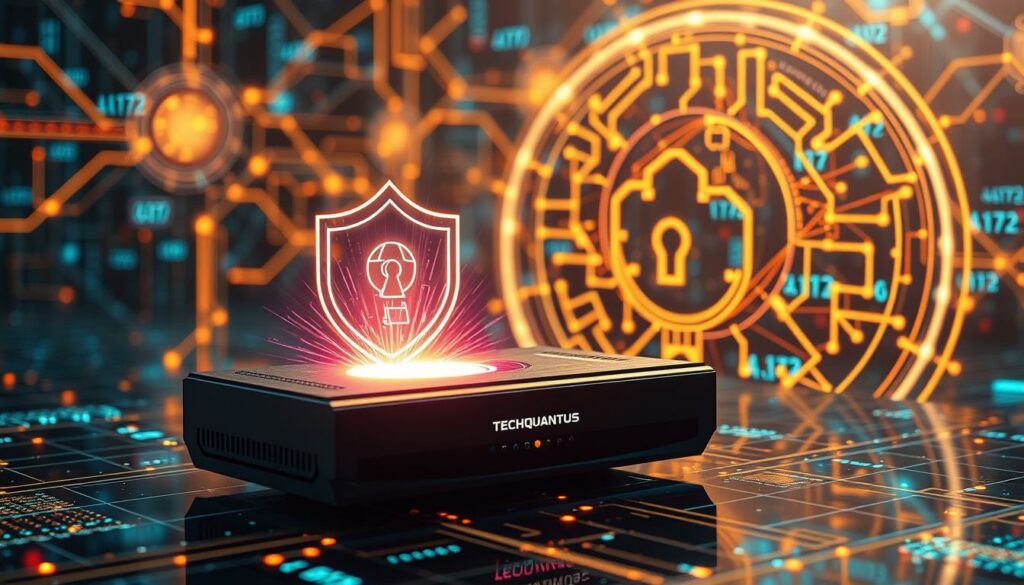Did you know a quantum attack on Bitcoin could lead to a loss of $3 trillion? This shows how important it is to protect our data as we move into the quantum computing era. Quantum encryption is a new tech that can keep your digital stuff safe from new cyber threats.
Old encryption methods won’t work well against quantum computers. So, we need new ways to keep our data safe. Quantum cryptography is a key part of this, using quantum key distribution to protect your data from powerful computers.
This article will explain how quantum encryption works and its benefits for keeping your data safe. We’ll also talk about the challenges of using it. This will help you make smart choices about your cybersecurity. For more on how quantum cryptography changes data security, check out this resource: Quantum Cryptography Transforming Data Security.
Key Takeaways
- Quantum encryption could prevent huge losses in cryptocurrency markets.
- Old encryption methods are vulnerable to quantum computers.
- Quantum key distribution offers new security for digital assets.
- Using quantum-safe tech is becoming a must for companies.
- New quantum-resistant solutions are key for staying safe online.
Introduction to Data Security and Encryption
In today’s digital world, keeping data safe is very important. With more data breaches happening, using strong encryption is key to protect personal and business info. We must keep sensitive data safe from cyber threats that could break its integrity and privacy.
Understanding the Importance of Data Security
Data security uses many strategies to keep digital info safe. Keeping your data safe stops unauthorized access and builds trust in online dealings. With the Cyber Warfare Market in North America worth about $15 billion, investing in strong data security is vital as threats grow.
Traditional Encryption Methods and Their Limitations
Old encryption methods like symmetric and asymmetric algorithms help protect data. But, they have their limits. They can be weak against new, complex attacks as tech gets better. Cyber threats are getting harder, making some old encryption less reliable. We need new solutions like Quantum Encryption. You can find more about this here.
What is Quantum Encryption?
Quantum encryption is a new way to keep information safe using quantum mechanics. It’s vital for keeping data safe in a world full of cyber threats. This method is key for secure data sharing.
Defining Quantum Encryption
Quantum encryption uses tiny particles like photons to make keys that can’t be easily stolen. It uses superposition and entanglement to make data safer. Unlike old encryption, quantum encryption can spot if someone tries to steal the key, making it much safer.
How Quantum Encryption Differs from Classical Encryption
Old encryption uses math to keep data safe, but it can be broken by powerful computers. Quantum encryption is different because it can’t be copied, making it much safer. This means every key is unique and can’t be stolen.
Groups like the US and Germany are pushing for safer standards. Companies like IBM are leading the way with quantum encryption. This is crucial for keeping data safe in a world where quantum computers are becoming more common. For more on quantum technology, check out this insightful article.
How Quantum Encryption Works
Quantum encryption uses the principles of quantum mechanics to protect data. This branch of physics has unique properties that traditional encryption can’t match. By using these properties in encryption algorithms, organizations can greatly improve their security.
The Role of Quantum Mechanics in Encryption
Quantum mechanics is key to quantum encryption. Quantum bits, or qubits, have special security features. Unlike regular bits, which are either 0 or 1, qubits can be both at the same time.
This lets quantum key distribution (QKD) detect hackers in real-time. If someone tries to intercept the data, it changes the quantum state. This alerts the sender and receiver to a possible threat.
Key Generation and Distribution in Quantum Encryption
Creating secure keys is crucial for quantum encryption. Quantum key distribution (QKD) lets people exchange keys safely using quantum mechanics. They measure the qubits and use strong encryption algorithms that resist interference.
The security of QKD comes from its statistical nature and quantum laws. This makes traditional attacks useless.
For organizations wanting high uptime in their software, they can look into achieving high uptime. They can use quantum encryption to improve their systems.
Benefits of Quantum Encryption for Data Security
Data security is crucial in today’s digital world. Quantum encryption is becoming key for protecting sensitive info. It offers strong encryption, keeping your data safe from complex cyber threats.
Unbreakable Encryption through Quantum Keys
Quantum encryption stands out for its strong encryption. It uses quantum mechanics to make quantum keys that are very secure. If someone tries to get these keys, both the sender and receiver will know, stopping hackers in their tracks.
This is vital as our digital info is more valuable than ever. It’s key to keeping your company’s data safe.
Resistance to Future Cyber Threats
Old security methods often can’t keep up with new threats. Quantum encryption is a new way to fight these issues. It’s made to beat advanced hacking tricks.
Fileless malware attacks jumped by 900% from 2019 to 2020. This shows we need new security tech. Quantum encryption is different because it can’t be easily broken by these new threats.

Using quantum encryption helps protect against future cyber threats. It’s important for modern cybersecurity to include this tech. By using quantum tech, you can make your sensitive data much safer.
| Type of Encryption | Security Level | Response to Cyber Threats |
|---|---|---|
| Classical Encryption | Moderate | Vulnerable to advanced attacks |
| Quantum Encryption | High | Resilient against future threats |
Quantum Cryptography: The Backbone of Quantum Encryption
Quantum cryptography is changing the way we keep data safe. It uses quantum key distribution (QKD) to create a secure encryption key. This key is vital for safe communication and can spot any attempts to listen in.
Quantum mechanics makes this possible, making old encryption methods like RSA less effective. This means our data is much safer.
Explaining Quantum Key Distribution (QKD)
QKD uses quantum bits (qubits) to send secure messages. If someone tries to tap into the message, it changes, alerting the senders. This is a big step up from old methods, where hackers could go unnoticed.
Real-world Applications of Quantum Cryptography
Quantum cryptography is used in many areas, making a big difference. Banks use it to keep transactions safe. Hospitals use it to protect patient data. And governments use it to keep sensitive info secure.
| Sector | Application | Benefits |
|---|---|---|
| Finance | Secure banking transactions | Protection against fraud and data breaches |
| Healthcare | Transmission of patient data | Enhanced privacy and compliance with regulations |
| Government | Secure national communications | Preservation of critical security information |
| Telecommunications | Secure network infrastructure | Improved consumer trust and service reliability |
Quantum cryptography is not just for secure messages. It’s also key to protecting our digital future.
Challenges Facing Quantum Encryption Technology
Quantum encryption faces many hurdles for its successful use. Key challenges include tech issues and the need for new infrastructure. Also, there are regulatory hurdles that differ by sector.
Technical Obstacles and Infrastructure Requirements
Adding quantum encryption to current systems requires big tech and infrastructure updates. This means new hardware for quantum key distribution and updates to blockchain platforms. Companies must overcome big challenges in their current systems, leading to higher costs and longer timelines.

Regulatory and Standardization Issues
Rules for quantum encryption are still catching up with the tech’s fast pace. Each industry has its own set of rules, leading to a call for standardization. The U.S. National Institute of Standards and Technology (NIST) is working on post-quantum cryptography standards. But, getting everyone to accept and use them is taking time. These rules can make it hard for companies to use quantum encryption and protect their data from quantum threats.
As quantum encryption gets better, solving these tech and rule issues is key. This will help it become more widely used in different areas.
For more insights on quantum computing and blockchain, check out this informative article.
Implementing Quantum Encryption in Your Organization
Adding quantum encryption to your system needs a careful plan. It must fit with your current data protection plans. This step can greatly boost your security against future cyber threats. The process includes several important steps.
Steps to Integrate Quantum Encryption Solutions
Here are the steps to add quantum encryption:
- Assess Your Current Security Measures: Look at your current systems to find areas that quantum encryption can improve.
- Define Your Operational Goals: Decide what you want to achieve with quantum encryption, like better data protection and meeting standards.
- Select the Right Quantum Encryption Tools: Check out different quantum encryption options to make sure they meet your needs.
- Integrate with Current Infrastructure: Make sure the quantum solutions you pick work well with your current systems for an easy transition.
- Train Your Staff: Teach your team how to fully use the new quantum encryption tools.
Choosing the Right Quantum Encryption Tools
Picking the right quantum encryption tools is key. Consider these factors:
- Vendor Reliability: Pick trusted vendors known for their quantum solutions.
- Compatibility: Make sure the tools work well with your current security setup.
- Long-term Support: Look for vendors that offer strong support and keep up with quantum tech changes.
Also, consider auto-scaling technology for your quantum solutions to keep them running smoothly. Don’t forget to include service protection like load shedding and rate limiting in your plan. For more tips on keeping your systems up and running, check out this article.
Case Studies: Successful Implementation of Quantum Encryption
Looking into quantum encryption case studies shows us how it works in real life. We see its use in finance and healthcare. These stories tell us how companies use this tech and the hurdles they overcame.
Examples from Finance and Healthcare Sectors
In finance, many banks use quantum encryption to keep data safe. A big bank used quantum key distribution (QKD) to guard its financial info. This made transactions secure in real-time, boosting security a lot.
Hospitals are also using quantum encryption to protect patient data. They add quantum tech to their data protection plans. This keeps patient info safe and private online.
Lessons Learned from Early Adopters
Companies that made the switch to quantum encryption stress the need for careful planning and training. They share important lessons:
- Invest in Staff Training: Teaching employees about quantum tech is key to using it well.
- Ensure Continuous Evaluation: Checking security often helps spot weak spots and get better.
- Adapt and Innovate: Being open to new ideas lets quantum encryption grow with new threats.
The Future of Quantum Encryption and Data Security
Data security is at a critical point as we look ahead to the future of quantum encryption. New trends in quantum tech will change how we protect data. With quantum computers getting stronger, they could break current encryption, threatening our data. It’s vital to understand these trends to stay ahead in data protection.
Emerging Trends in Quantum Technology
Quantum tech’s potential is huge and diverse. Key trends to watch include:
- Quantum Cyberattacks: IBM predicts the first quantum cyberattack, called Q-Day, will hit around 2030. This will challenge traditional encryption.
- Regulatory Integration: Countries like the U.S., Germany, and Singapore are adding quantum-safe encryption rules to their laws, especially in finance.
- Blockchain Innovations: Big names like Microsoft and Walmart are using private blockchain networks to get ready for the quantum era.
- Quantum Security Deployments: Banks and governments are using quantum random-number generators to make transactions safer and more secure.
- Post-Quantum Standards: The U.S. National Institute of Standards and Technology (NIST) has set guidelines for dealing with the quantum threat. This helps organizations adapt.
Potential Impacts on Global Security Protocols
Switching to quantum encryption will change global security big time. Key points to consider include:
- Enhancing Data Security: Quantum cryptography could change encryption, making it hard for hackers to get in.
- Collaboration on Standards: Setting standards for quantum-safe protocols will be key worldwide to keep security high.
- Addressing New Challenges: With more IoT devices and AI, we need to watch out for new risks to avoid attacks.
- Adoption of Zero Trust Models: Using a Zero Trust model more will mean checking security at every level.
- Preparedness Against Internal Threats: Companies must tackle insider threats and keep strong security in place.
As we blend quantum tech into our security, quantum encryption’s future is key to keeping data safe. It’s important for companies to keep up with these trends and get ready for big changes.
| Trend | Potential Impact |
|---|---|
| Quantum Cyberattacks | Current encryption could be at risk, leading to a need for urgent cybersecurity updates. |
| Regulatory Changes | New rules for quantum-safe encryption will be required, especially in important areas. |
| Blockchain Developments | Blockchain tech will help make data transactions safer and more secure. |
| Quantum Standardization | Global efforts will work towards the same security levels, making sure everyone is protected. |
Understanding the Investment in Quantum Encryption
Companies are now seeing how crucial strong data protection is. This makes investing in quantum encryption a key strategy. Knowing the costs helps businesses make smart choices about their cybersecurity.
Cost Implications for Businesses
Looking at the costs of quantum encryption means considering setup, upkeep, and savings from avoiding data breaches. Though it may cost a lot at first, the benefits later on are worth it. Companies get safer data and are less likely to face cyber threats.
This means they keep their good name and financial health safe.
ROI Considerations in Data Security Investments
Looking at the ROI of data security shows the value of using new tech like quantum encryption. By stopping data breaches, companies can save a lot of money. The market for Network Encryption is growing fast, showing the worth of using advanced encryption in business plans.
Adding quantum encryption to your cybersecurity plan boosts data safety. It also saves money over time and gives you an edge in the digital world.
Conclusion
Quantum encryption has made big strides in keeping data safe. It’s key in today’s changing cybersecurity world. This tech uses quantum keys for encryption that’s hard to break, keeping your important info safe from threats.
Businesses need to get on board with quantum tech fast. With more fileless malware and complex cyber threats, quantum encryption is crucial. It helps keep your digital stuff safe and private.
Quantum encryption is more than just a new trend. It’s a must-have for keeping data secure. By using the latest in quantum tech, you can stay ahead of cyber threats. This tech is making online interactions safer, showing why it’s important to start using it now.
FAQ
What is Quantum Encryption?
Quantum Encryption uses quantum mechanics to secure data. It offers strong encryption that can’t be broken by cyber threats.
How does Quantum Encryption differ from traditional encryption methods?
Traditional encryption uses math, but Quantum Encryption uses quantum particles. These particles have special properties that make the encryption stronger and detectable if someone tries to intercept it.
What is Quantum Key Distribution (QKD)?
QKD is a key part of Quantum Encryption. It lets people securely share keys using quantum states. This makes it hard for others to access the information.
What are the benefits of using Quantum Encryption?
Quantum Encryption offers strong encryption that warns if someone is trying to intercept it. It also protects against new cyber threats, making digital assets safer.
What challenges does Quantum Encryption face?
Challenges include needing special equipment, hardware limits, and rules that need to be set. These make it hard to use Quantum Encryption everywhere.
How can organizations implement Quantum Encryption?
Companies can start by checking their current security. Then, they should pick the right quantum tools and make sure they work with what they already have. This will help protect their data better.
Can you provide examples of Quantum Encryption applications?
Yes, Quantum Encryption is used in finance and healthcare. These sectors need to keep sensitive info safe. It shows how well Quantum Encryption works in protecting data.
What are the future trends in Quantum Encryption?
The future looks bright with new quantum tech. We might see standard security across the globe. Also, quantum networks could make communication safer.
What are the financial implications of investing in Quantum Encryption?
Starting with Quantum Encryption costs money upfront and to keep it running. But, it can save money by stopping data breaches. This can also improve a company’s cybersecurity ROI.
Source Links
- https://thequantuminsider.com/2024/09/08/blockchain-and-quantum-computing-are-on-a-collision-course-expert-warns/
- https://techcentral.co.za/first-quantum-cyberattack-expected-2030/251246/
- https://www.mdpi.com/2079-9292/13/17/3569
- https://www.openpr.com/news/3648692/cyber-warfare-market-forecast-revenue-trends-and-growth
- https://www.openpr.com/news/3648941/comprehensive-market-forecast-for-network-encryption-market
- https://wired.me/technology/artificial-intelligence/a-breakdown-of-dubai-cybersecurity/
- https://content.techgig.com/expert-opinion/achieving-high-uptime-in-modern-enterprise-software/articleshow/113180302.cms
- https://www.finanznachrichten.de/nachrichten-2024-09/63202962-david-pointcheval-world-renowned-cryptography-researcher-joins-cosmian-as-chief-scientific-officer-008.htm
- http://www.itnewsonline.com/PRNewswire/David-Pointcheval-world-renowned-Cryptography-Researcher-Joins-Cosmian-as-Chief-Scientific-Officer/1008895
- https://www.nature.com/articles/s41377-024-01578-z
- https://www.mdpi.com/2079-9292/13/17/3562
- https://www.wevolver.com/article/the-quantum-threat-to-cybersecurity-and-the-quest-for-quantum-proof-encryption
- https://facts.net/history/35-facts-about-the-history-of-cryptography/
- https://theinscribermag.com/intelligence-and-security-pillars-of-modern-protection-and-stability/
- https://www.cybersecurity-insiders.com/addressing-critical-challenges-in-responsible-enterprise-ai-adoption/
- https://www.harlemworldmagazine.com/the-rise-of-quantum-computing-a-new-technological-era/
- https://businessnewsthisweek.com/blockchain/blockchain-currency-potential-to-transform-the-retail-market/
- https://dev.to/farzana_rahman/unleashing-the-power-of-qudits-expanding-horizons-in-quantum-computing-3eff
- Budgeting and Cost Control for IT Projects: My Expert Advice
- Learn How to Manage IT Projects Effectively with My Advice
- I Share My Best Data Backup Strategies Using Cloud Storage
- I Learned About AI Mistakes That Could Change Your Life
- Sustainable & Green Energy Solutions for Next‑Gen Data Centers Trend Report




